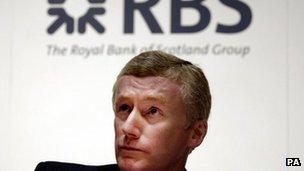How can bosses be punished for failure?
- Published

Regulators could get new powers aimed at preventing the situation that arose at RBS
Fred Goodwin would have to have an unusually thick skin not to feel humiliated by losing his knighthood.
But many people will have asked why no other action, legal or regulatory, has been taken against him.
Among them has been Lord Turner, chairman of the Financial Services Authority (FSA).
When the regulator published its 452-page report, external last December into the collapse of the RBS banking group, he quickly put his finger on the issue.
"Why has no-one in the top management of RBS been found legally responsible for the failure and faced FSA sanction?" he asked.
"And if action cannot be taken under existing rules, should not the rules be changed for the future?"
'Insufficient evidence'
The FSA's report catalogued many bad decisions by Mr Goodwin and his senior management colleagues which contributed to the collapse of RBS and its bail-out by the taxpayer in 2008.
But a large section of the report was devoted to explaining why the FSA's lawyers thought that "there was not sufficient evidence to bring enforcement actions which had a reasonable chance of success in Tribunal or court proceedings".
How come? The FSA's explanation boiled down to two big points.
Firstly, neither the law nor FSA rules make bank management automatically liable for punishment when things go wrong.
"A successful case needs clear evidence of actions by particular people that were incompetent, dishonest or demonstrated a lack of integrity," the FSA said.
And the regulator added that bad commercial judgement, such as the take-over of the ABN Amro bank with inadequate "due diligence", could not be punished simply with the benefit of hindsight.
Taking legal or regulatory action was not in fact impossible, the FSA's lawyers concluded.
But they decided they simply did not have enough evidence for a successful case, although Lord Adair admitted the decision was arguable and that many people would find it difficult to accept.
New laws to come?
The FSA will publish, in the next few months, a discussion paper to start a public debate on how new rules could be brought in to make sure bank executives and directors do not take risks that bring down their organisations in future.

Lord Turner has suggested the rules holding bank directors to account should be changed
This could eventually lead to new laws, or new powers for the FSA.
These might include a change to the law so that bank bosses are indeed made "strictly liable" in law for bank failures, with fines and bans the consequence.
New FSA rules might also give it the power to ban directors and senior executives automatically from the financial services industry, unless they could prove they had tried to oppose the risky strategies that had caused a bank to fail.
Current sanctions
In the financial services industry, the FSA can and does take action against individuals who have broken its rules or principles.
The sanctions can range from private or public censures to bans and fines, and it has become more aggressive in the past few years.
For instance, it has fined or banned more than 100 mortgage brokers for mortgage fraud and other offences.
From time to time it fines firms and individuals for dishonesty, or breaches of its rules, such as treating customers unfairly.
It also prosecutes people for insider trading.
Company laws
Leaving aside the question of being prosecuted for fraud under the criminal law, company directors can have action taken against them under the Company Directors Disqualification Act., external
This lets the Insolvency Service, external, on behalf of the Department for Business, Innovation and Skills (BIS), external, take directors to court.
They can then be banned from running companies, usually when they have been found guilty of wrong doing in the aftermath of a company going bust.
Among the things they can be punished for are:
specific offences under company law
wrongful trading, for instance trading while insolvent
and "unfit conduct" when running an insolvent company.
Disqualification for up to 15 years can be a severe sanction if it ruins your career.
Companies House, which keeps the list of disqualified directors, says there are about 7,500 names on it at the moment.
Slow procedure
Another avenue for action against miscreant company directors is the 2006 Companies Act., external
This allows a company, in practice its board of directors, to sue other directors for breaching their duty of care to the company.
Not surprisingly this does not happen very often, as directors are a bit hesitant to do this.
In theory shareholders can also sue directors under the same law, but it is a cumbersome procedure and even rarer.
Dr Carsten Gerner-Beuerle, a lecturer in corporate law at the London School of Economics (LSE), says: "What is unsatisfactory in the law is the way shareholders can sue directors - they are severely restricted in that.
"If you compare it to the United States where it is probably a bit easier for them, that may have a positive effect if private parties can bring law suits.
"The FSA has become more pro-active with its scheme to vet directors and look more closely at what is happening in companies - that is the right response, probably," he added.
- Published1 February 2012
- Published31 January 2012
- Published1 February 2012
- Published31 January 2012
- Published31 January 2012
- Published12 December 2011